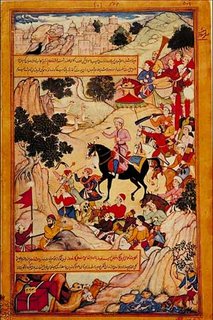I've had some very interesting, high-quality responses to my immigration
post. Since HaloScan will eventually delete the comment boxes, I thought I'd like to preserve some of them (and others were interesting, too, I just couldn't think of anything particularly insightful to say in response).
Kerner points out the difficulties of enforcement and the need for cheap, unskilled labor:
Present immigration law in the USA is just like prohibition. It is very restrictive in theory (as you say, legal immigration is almost impossible unless you have a relative here already), but it is not, and will never be, enforced. Here's why. The illegal immigrants are too intertwined with the income streams of every American today. If you go to restaurants, stay at hotels, buy gasoline, live or work in a place that has a cleaning or landscaping service, live or work in a place that has drywall in it, or (above all) eat meat or plant life, then chances are you have illegals working for you. It may be alarmist to say our economy would collapse without the illegal workers, but to eliminate them would put a strain on too many people to make doing so politically feasible. Say the government raided all the meat processing plants in Iowa (as happened once in the 80's) such that they actually had to shut down or scale back operations (as didn't happen, because political pressure compelled the feds to back off on enforcement). Sure, the illegals lose their jobs, but so do the office workers, sales force, truck drivers, managers at those companies. Farmers and others in the economic system also suffer. There's a shortage of meat, followed by a supply but at much higher prices.In other words, the federal government will have just put thousands of non-immigrant voters in a world of economic pain, while simultaneously angering every hispanic voter in the state. Iowa is a swing state where a few thousand votes can make the difference. No president (not republican, not democrat, not anybody) is going to throw away Iowa's electoral votes, much less do the same thing all over the country.So, just like prohibition, we have the form of a law, with no possibility of society ever conforming to its provisions.The implication of what Kerner is saying is that the US should create an open borders system, in which only unemployed aliens would be subject to deportation, but in which anyone who can find a job in the US (say, within a month of entry) is allowed to stay. (This is assuming that we do not wish to have laws that are widely flouted.)
The other implication is an interesting one: that the advanced industrial economy is basically non-self-supporting. Even in an advanced industrial economy, cheap unskilled labor will still be necessary, but such cheap unskilled labor can't be produced by the advanced industrial economy itself. Why not? Presumably (if the implication holds) because those born in an advanced information economy with the basic skills, reliability, and drive to make money end up getting more skills and pricing themselves out of the unskilled labor market.
Interestingly, this raises the possibility of a Rosa Luxembourg style argument, that advanced capitalism needs a backward periphery, with exploitable cheap labor, to survive. The only difference is that in the 1910s capital had to go to the labor (colonialism), while today, capital imports the labor (immigration). If all the world becomes like the US, Western Europe, and Japan, then the system will collapse through lack of cheap labor. But where will the revolutionaries come from then?
Or perhaps the difficulty is only one of short-term adjustment, and a lower supply of cheap labor would be compensated for by automization, and labor-saving technology. (Predictions of the demise of capitalism have a bad track record.)
Rick points out that despite my point 25, America
is a nation of immigrants in some sense:
But even the dictionary definition would allow the phrase "nation of immigrants" (if it assumes "and their descendants"). My Random House dictionary defines immigrant as "a person who migrates to a country for permanent residence." Most people's ancestors qualify. And pictorially I think there is something to picture. (People stepping off of a boat, many having to learn English, make an oath of abjuration of the King of Prussia and an oath of allegiance to King George III, etc.) What we make of that for policy is another thing.For some purposes, including some fairly important ones, he's right. If one is talking about relation to the land for example, or mobility, then one could say that the "English" and their descendants are immigrants as much as any one "fresh off the boat." Much of the cachet of American Indian spirituality, for example, comes from our sense that we don't have any organic relation to the land, hallowed by centuries of shrines and spirits of the dead -- and that's something we feel we want.
But for others purposes, I still think 25 and 27 apply. For example, contrast
TK and Rick's response. Rick writes
On my dad's side of the family we go back at least to 1748, and in some lines further. On my mom's side, to the 1870's. I picture those pretty evenly.In other words, his feeling of "bilateral" ancestry, gives him a sense that he can't really take sides for one or against the other.
But TK writes:
I am keenly aware of how recently my family came to America and even to North American. It was just 100 years ago that my great-grandfather, his wife, two kids, his parents and sister took Canada's offer of land to anyone willingly to try to successfully work the farm lands of Canada (the "English" had no interest in living there, but knew someone needed to settle the land). I was able to interview my grandfather extensively before he died 1 1/2 years ago and it is amazing how he took his immigration for granted and was totally not
interested in his home country (we have no remaining relatives there, he said).. . .
People have started to forget the awful way the immigrants of that period were treated. One example: in Canada, Ukrainians were treated as not capable of becoming as educated or cultured as the "English". They were treated terribly, even to the point of detaining Ukrainians in camps during WWI. Only recently has Canada started to address the sins of their forefathers and offer apologies.This is an example of what I meant by point 27. TK's perspective can't help but be different from mine, because she is responding to a different family history. She puts herself in the shoes of the immigrants, and feels it is important to remember the sins of the "English."*
Now, I share a
lot with TK. But when she speaks like that there is a small part of me that gets its back up. Being one of the "English" (US division, not Canadian, but that doesn't change the point much -- immigrants to the US have their own grievances to remember) I wonder, why does one always have to remember the sins of
my ancestors in particular? And why is it that whenever we tell the story of 19th century America, all the good things were (implicitly) done by all of "our" ancestors, but the bad things were done only by "my" ancestors. I mean, if my people get all the blame for nativism, can we also hog all the credit for creating a country that her ancestors want to come to?
Now, the sensible part of me knows that this way lies madness, that just as the Talmud says all Jewish converts are mystically present at Sinai to accept the Law, so too it is the whole myth of America that at Bunker Hill, and Trenton, and Philadelphia, and Gettysburg the ancestors of all American todays citizens were mystically present, that the Continental Army is "we" for all of us.
But that is the sore spot in the immigration debate. If you read John Podhoretz at the NRO's Corner debating John Derbyshire, it's crystal clear that the real issue for him is this: were the "Old Stock" Yankees** right in all the demeaning things they said about my immigrant forbears? And he demands that public policy today answer,
NO! They were WRONG! And who can blame him for loving his family and loving his country and hence defending the action by which the two became joined? (A very well written, and less emotional version of the same idea is
here.) And he sees that any form of exclusionary policy is tantamount to admitting that exclusion in the 1920s might well have been right in demeaning his people. But he hardly seems to realize that the people he is demanding be recognized as senseless bigots themselves have descendants who feel the same way about their forbears that he does about his.
This is the hidden fault line that runs beneath the immigration debate. It doesn't act in a simple and straight forward way. Most of us have feet on both sides. For example, I am "old-stock" in ancestry, but I thank God for the great wave of immigration that brought the Augsburg Evangelical Church to these shores and kept it confessional. I think we can live with this contrast in perspectives, and maybe even be strengthened by it. But as the contrast of comments shows, whether we like it or not, the fault line is still there.
*That's a Canadian term, I guess. In the US we don't really even have a widely used term for the equivalent, which is basically those whose ancestors were in the United State as free citizens before 1780-1790 or so. These were mostly, but not all, "English" -- they also include the Dutch of the Hudson Valley, the Germans of the Delaware valley ("Pennsylvania Dutch"), the Gaelic Scots of North Carolina, and the Huguenots scattered throughout the colonies, but especially in South Carolina. "Old stock" is perhaps the best term for what I mean.**Outside the US, this means Americans, but inside the US, it means Northerners, and in the Northeast it means descendants of the Puritan settlers of New England.Labels: immigration



